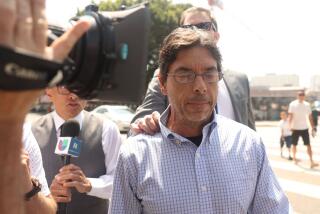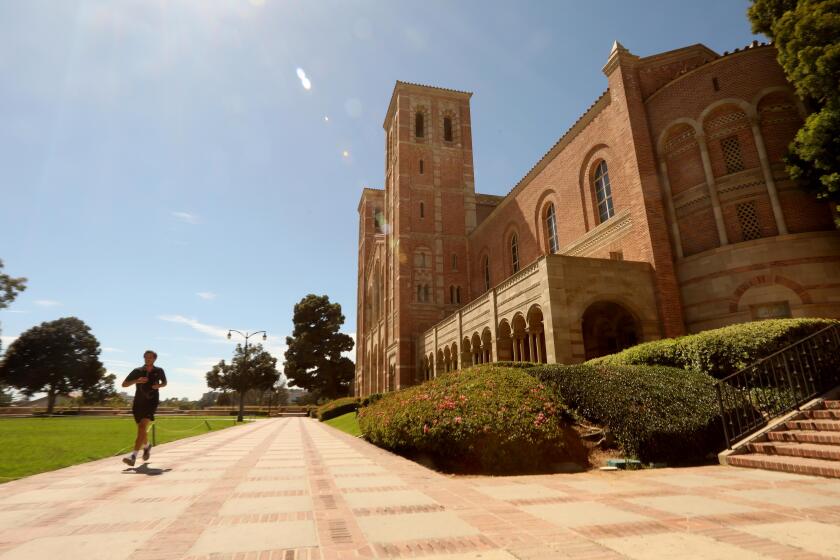Conrad Murray undecided on whether to take the stand
Michael Jacksonâs doctor has yet to decide whether he will testify at his involuntary-manslaughter trial. But if he does, he may say he was on the phone in a bedroom foyer when the pop star killed himself with a syringe of leftover drugs, according to trial testimony Monday.
The scenario emerged during the cross-examination of a defense medical expert who said his testimony was informed by âtwo extended conversationsâ with Dr. Conrad Murray.
The witness, an expert in the surgical anesthetic that killed Jackson, was warned repeatedly not to disclose any information from the meetings, initially by a prosecutor and then by an exasperated judge who threatened contempt of court charges.
FULL COVERAGE: The trial of Conrad Murray
But in his answers â many later stricken from the official transcript â and in his theory on Jacksonâs death, Dr. Paul White suggested what Murray told him: The doctor filled a syringe with 50 milligrams of the anesthetic propofol and additional lidocaine, injected half the mixture into Jacksonâs veins and set the syringe aside. When Murray stepped into an entranceway to make calls, Jackson injected the rest.
âIt was some time during that 40-minute period where I believe Mr. Jackson had the opportunity and likely self-administrated the final fatal dose of propofol,â he said.
The scenario White related was distinct from the account Murray gave police two days after Jacksonâs 2009 death. In that interview, he said he left the singerâs room for just two minutes to use the restroom and found Jackson lifeless when he returned.
Whiteâs second day on the witness stand was filled with testy exchanges with the prosecutor who was questioning him. Deputy Dist. Atty. David Walgren objected again and again to what he said were the witnessâ attempts to tell jurors what Murray told him privately, comments inadmissible in court.
With Murrayâs trial winding to a close, jurors have as evidence only one account from the defendant â the 2 1/2 -hour hour police interview. It was conducted before investigators had toxicology tests, phone records and witness statements, and many issues, including Murrayâs phone use, were not addressed.
Even as his attorneys announced they would likely wrap up their case Tuesday, Murray told Superior Court Judge Michael Pastor he had yet to make a final decision on whether he would testify, saying that âdepends on how the case progresses.â
Pastor cautioned White during his testimony Monday to listen carefully to the prosecutorâs questions, but White continued hinting at information from the conversations. At one point, he said Jackson had his âown supplyâ of propofol â something never mentioned in the police interview.
âYou keep throwing out these kind of rehearsed lines,â Walgren complained.
The judge sent the jury out of the courtroom and upbraided White: âItâs deliberate. I donât like it. Itâs not going to happen again.â
But when testimony resumed, White appeared to make reference again to his conversations with Murray.
When asked whether Murray left the syringe behind âwhen he left the bedroom,â White replied, âFirst of all, I donât know that he left the bedroom. I was told that he was standing in a kind of hallway.â
The judge ordered the response stricken from the record, and after jurors left for lunch, he railed at White.
âThat is a direct violation of my order. And, quite frankly, it constitutes contempt of court, direct contempt,â Pastor said.
The contempt of court allegation is the second for White, who was dressed down by the judge earlier this month for making comments about a prosecution witness reported on a website. Pastor said he was contemplating a $1,000 fine and set a later hearing on both issues.
In much of his cross-examination, White seemed to attempt to strike a balance between condemning Murrayâs medical practices, which have been roundly criticized by previous experts, and defending them enough to suggest no crime occurred.
He agreed that Murray had deviated from the standard of medical care in providing Jackson propofol for insomnia, a role he said âno amount of money could convince me to accept.â When the prosecutor grilled White about Murrayâs delay of about 20 minutes in summoning an ambulance, he said he would have called 911 immediately. But, he added, Murray âreacted as many physicians would.â
âHe was probably very anxious, and in those situations it is very stressful for anyone,â he said.
Walgren ridiculed his response, noting that Murray was, by his own admission to police, holding a cellphone in his hand.
âAre you saying he wasnât capable of pressing 9-1-1?â the prosecutor snapped. White shrugged off the question, but later insisted Jackson would have died no matter how quickly help came.
FULL COVERAGE: The trial of Conrad Murray
More to Read
Sign up for Essential California
The most important California stories and recommendations in your inbox every morning.
You may occasionally receive promotional content from the Los Angeles Times.












